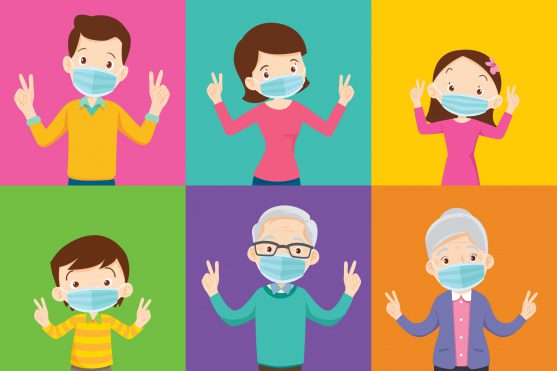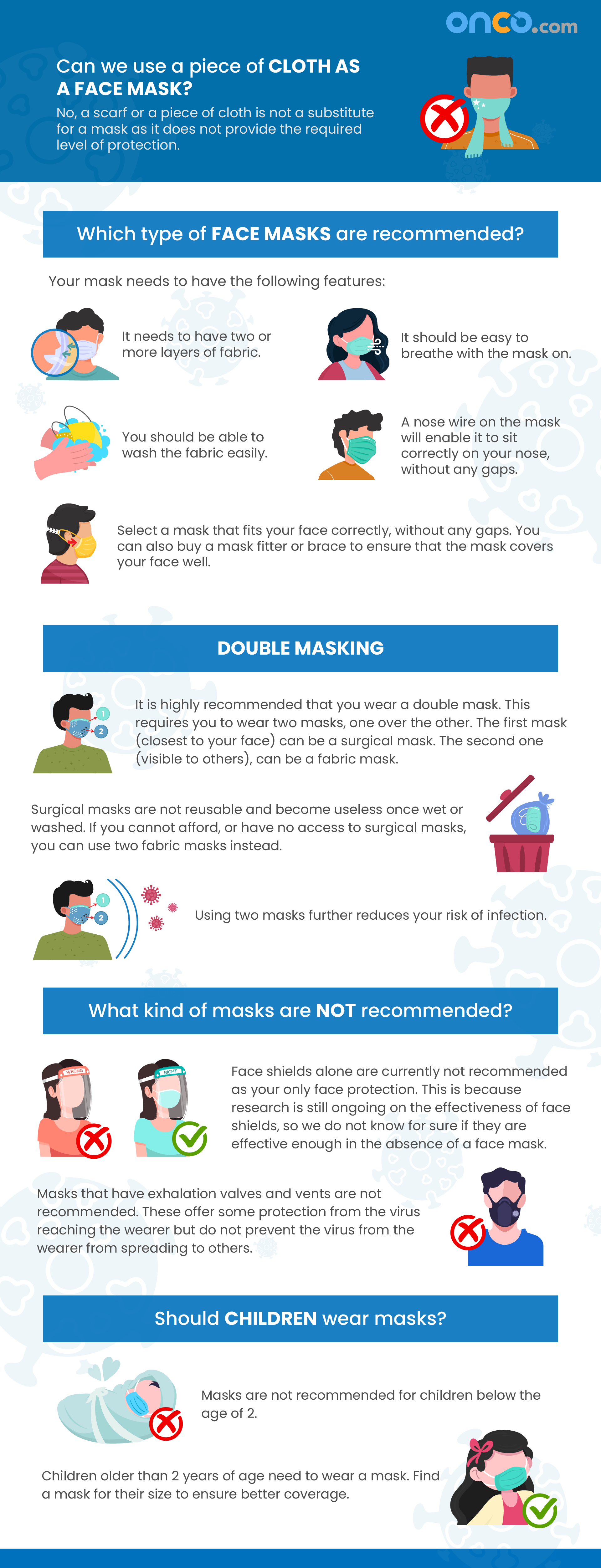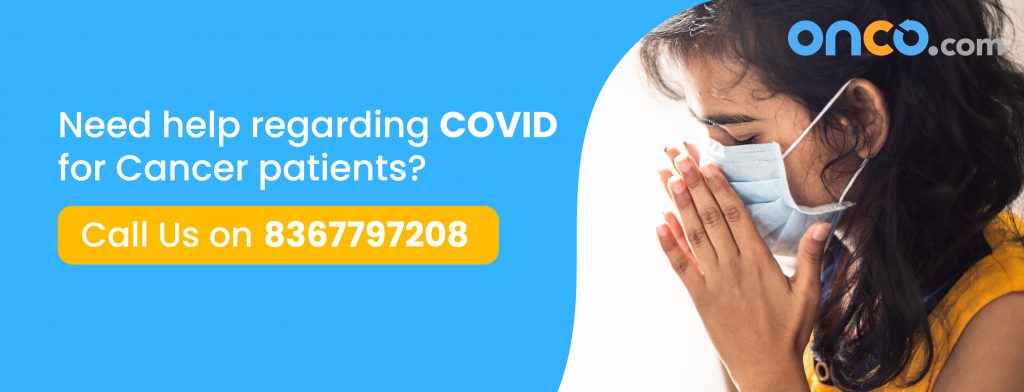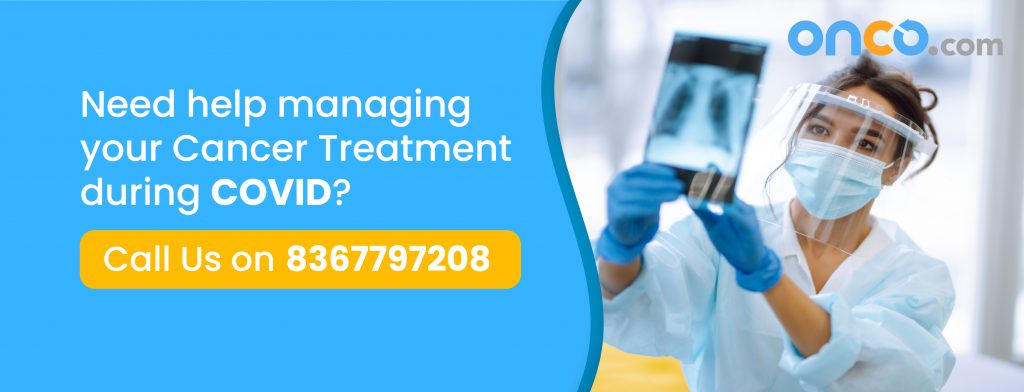By now we are all aware that the 2nd wave of COVID-19 has arrived. The outbreak of the new strains of coronavirus (COVID-19) and the rate at which the infection is spreading is worrying.
The outbreak initially happened in march 2020 and the cases continued to increase upto september 2020, after which there was a slight decrease in the number of cases and it appeared that normalcy would be restored soon.
Unfortunately from February 2021 the sudden surge in COVID-19 cases in India has taken a lot of people by surprise. Unlike the first wave, the second coronavirus wave is of concern because this new mutant SARS-COV is very contagious and people of age group 18 to 45 with strong immunity are also susceptible.
If you are a cancer patient or a caregiver of a cancer patient, your worries and fears may be multifold, understandably. But there is nothing to worry about, as coronavirus infections can be avoided if sufficient precautionary measures are taken.
Here we discuss how you can stay away from COVID-19. This article will benefit those with the following roles on a cancer journey –
- patients currently undergoing treatment
- those recently diagnosed with cancer
- families and caregivers of a cancer patient
- cancer survivors
Before we proceed, here is a quick summary of coronavirus. It is a flu-like virus that can affect our respiratory tract and lungs.
The symptoms include fever, cold, fatigue, body aches and shortness of breath. Along with these, some new COVID-19 symptoms have been noticed during the second wave including loose motions, conjunctivitis and vomiting.

How can cancer and its treatment affect the body’s immunity?
The role of our immune system is to protect our body from diseases caused by various germs including coronavirus.
For people with cancer or those undergoing cancer treatments, the immune system may be weak, reducing your ability to fight infections. This is because certain treatments like chemotherapy, immunotherapy, and radiotherapy can affect the production of white blood cells which form a part of the immune system and fight infections.
Some cancers that directly affect the immune system like lymphoma or leukemia can also lower your ability to fight infections.
Weakened immunity and the risk of coronavirus infection
When our body’s immune system weakens, the ability to fight infections decreases. Though this can increase the risk of COVID-19, daily hygienic measures can help you prevent it.
This virus is known to spread through respiratory droplets from an infected person’s cough or sneeze or touching unhygienic surfaces where the virus may lie after being released from an infected individual. In addition to this, the second wave COVID-19 virus is known to spread through inhalation of very fine respiratory droplets and aerosol particles.
People release respiratory fluids during exhalation (e.g., quiet breathing, speaking, singing, exercise, coughing, sneezing) in the form of droplets across a spectrum of sizes. These droplets carry viruses and transmit infection.
Hence, the responsibility of ensuring hygiene and preventing the risk of coronavirus infection is not just with cancer patients, but their families and caregivers as well.
The preventive measures do not apply for the new coronavirus disease alone, but also for any other lung viruses that could take advantage of a weak immune system and cause various infections like flu as well.
 Advice on COVID-19 for patients currently on cancer treatment
Advice on COVID-19 for patients currently on cancer treatment
If you are a cancer patient undergoing treatment like chemotherapy or radiation therapy, you should continue your treatment unless otherwise advised by your doctor to reschedule your session.
However, if you are concerned about the risks of infection, and symptoms, speak with your oncologist about your fears to understand if you need to delay treatment.
Though most of the recommended measures are similar for healthy individuals, cancer patients are advised to take more stringent measures. This is because they are at a higher risk of getting infected due to the reduced immunity from cancer and its treatment.
Your doctor might advise you to interrupt treatment to avoid exposure. A detailed discussion on the pros and cons of delay, and the effect on the continuity of care need to be discussed.

Here is a detailed guide on ensuring personal hygiene and staying away from catching any infection.
Clean your hands often
- Wash your hands with soap, for at least 20 seconds. Especially after a cough or a sneeze, visiting public places and touching public surfaces, using restrooms, before preparing food and eating, after contact with animals or pets, or touching frequently used things like books, etc.
- If soap and water are not available, carry a hand sanitizer (containing at least 60% alcohol). If the hands are visibly dirty, soap and water are recommended.
- Avoid touching your face, nose or eyes often.
Wearing masks
- People who are sick should wear masks to make sure that they don’t transmit the virus. However, citing the decreased immunity in cancer patients, it is better that you wear masks whenever stepping out or interacting with individuals outside the family.
- Wear a double mask, first wear a disposable surgical mask, then wear a cloth mask that has multiple layers of fabric, the cloth mask should push the edges of the disposable mask against your face. Alternatively, you can wear a single N95 mask.

Know more about which face masks are best for cancer patients.
Further preventive measures
- Stay home and do not travel except for necessary situations like lab and urgent treatment appointments.
- Minimise social interactions.
- Stay aware of your surroundings outside home, and avoid touching common area surfaces.
- If you are coming back home from outside, make sure your hands are sanitized and clothes changed. Your family members need to do the same.
- Avoid meeting people who are unwell.
- If you come across people with a cough, maintain a distance of at least 6 feet and advise them to wear masks.
- Do not touch your face often. When you do, avoid touching with unclean hands.

For people recently diagnosed with cancer
Some cancers that affect the bone marrow like leukemia and lymphoma may weaken your immune system. Discuss with your treating oncologist about the risks of a weakened immune system. Make sure you follow the above preventive measures and keep yourself under medical guidance.
Talk to your oncologist about the right time to get vaccinated based on your treatment plan.
Vaccination for Cancer patients
Experts recommend vaccination for COVID-19 as a measure to prevent infection or serious disease after infection. It is recommended that most patients with cancer or history of cancer should receive the vaccine.
The purpose of vaccination is to improve specific immunity against the virus by priming the blood cells to viral antigens. However, the medical history of every cancer patient is different and every cancer patient has a different level of resistance and disease fighting power.
- Patients undergoing cancer surgery should consult their doctor before receiving the vaccine. As the risk, benefits and timelines differ depending on the disease and the surgery planned. As the vaccine is given in the shoulder region, those undergoing breast surgery might have to receive the vaccine on the opposite shoulder for better results.
- Patients on chemotherapy might have to wait for a few days or weeks before they receive the vaccine. They may discuss with their medical oncologist prior to considering vaccination. It is pertinent to ensure that the white blood cells and platelet counts are not low at the time of vaccination. A CBC (complete blood picture) may be done prior to vaccination.
- Patients with Leukemia or on stem cell therapy may need to delay vaccination for a few weeks to months after an intensive chemotherapy or stem cell therapy. Patients should discuss the time of their vaccination with their treating doctor.
For caregivers of cancer patients
Apart from ensuring personal hygiene as detailed above, people who are taking care of the cancer patients should ensure extra preventive measures, to ensure that the environment around them is hygienic.
Here are some preventive measures you should ensure to prevent the contact of COVID-19 for your ward’s, and your own safety –
- Make sure the furniture, utensils, and other surfaces that the patient uses regularly are disinfected and cleaned regularly (at least twice a day)
- Frequently touched surfaces should be routinely disinfected and cleaned (for example tables, doorknobs, light switches, handles, desks, toilets, faucets, sinks, cell phones)
- Disposable gloves are to be worn when cleaning and disinfecting surfaces
- The gloves are to be discarded after each cleaning. Clean your hands immediately after gloves are removed.
- If surfaces are dirty, they should be cleaned using a detergent or soap and water prior to disinfection.
- For disinfection, diluted household bleach solutions, alcohol-based solutions with at least 70% alcohol, and most common household disinfectants should be effective.
- Get vaccinated.
Additionally,
- Avoid crowded places like railway and bus stations, malls, airports, movie theatres, etc
- If you come across people with a cough, maintain a distance of at least 6 feet and advise them to wear masks
- Avoid using public transport and avoid shared travel. Ensure your hands are sanitized after traveling locally
- Be aware of your surroundings and avoid touching common surfaces in public places, like staircase railings, benches, door handles, etc. when you are out of home
- After visiting public places, on your return home ensure to change your clothes and wash your hands thoroughly with soap (for at least 20 seconds)
- When someone is visiting your home, or the caregiving place, ensure the visitors wash their hands and maintain a distance of at least 1-2 meters from the patient
If you have been exposed to the virus, and are a carer of a cancer patient, it is best advised to isolate yourself from the patient, and request for respite care.
For cancer survivors
If you have had cancer in the past, and now in remission, the risks are comparatively high for you to contract the coronavirus. The extent of the risk may depend on the type of cancer, health complications and the treatment you have received – the more your immune system is compromised, the higher is the risk.
Hence, you should ensure that you follow the daily preventive measures (as stated above), along with those who are living with you.
We strongly recommend not only patients but also their caregivers and cancer survivors to get vaccinated on priority.
If you, or a loved one, is diagnosed with cancer and have any queries regarding coronavirus and its impact on cancer, please call us on +91-79965-79965. Our care managers will be happy to help you.


